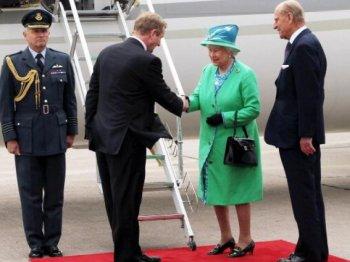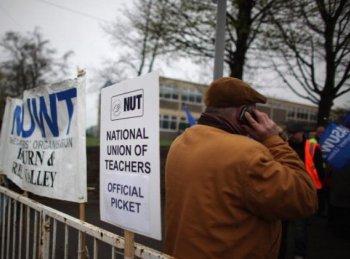The filibustering that frayed tempers, forced ageing Lords to sleep in camp beds in the Palace of Westminster, and raised the threat of an unprecedented “guillotine motion,” appears to have come to an end after the longest debate in U.K.’s House of Lords in 40 years.
The legislation that log-jammed in the unelected chamber was a proposed electoral reform bill, which includes a referendum on the Alternative Vote (AV). The AV system allows voters to rank candidates in order of preference on their ballots. AV is central to the agreement of the coalition government, composed of Liberal Democrats and Conservatives, and the Conservative Party’s election promise to reduce the number of members of Parliament.
On Monday, the leader of the House of Lords, Lord Strathclyde, told the lords that agreement had been reached through “the usual channels” to complete the bill with a “package of concessions” by Wednesday evening, making it to the statute book in time for the referendum on AV to be held in May as the coalition planned.
In addition to allowing a referendum on the AV system, the electoral reform bill would also reduce the number of members of Parliament from 650 to 50 and redraw electoral boundaries; an adjustment that would see the Labor Party lose seats.
Labor peers, had objected to this second element of the bill, and to the coupling of the two reforms, which they said should form two separate bills.
The Labor peers are easily outnumbered by the coalition in the House of Lords, and their opposition would have proved little obstacle, had it not been for the tight time frame; the bill needs to go through by Feb. 16 in order for the referendum to be held during the election in May.
Labor peers were widely accused of filibustering—using long anecdotal speeches and picking over the finest of details to delay proceedings—in an attempt to drive a wedge between the coalition partners.
The coalition response was to push the debates longer, even carrying one marathon session through the night, with lords sleeping on camp beds and cushions in Westminster. With the deadline approaching for a May 5 vote, talk began of the possibility of using, for the first time in the history of the House of Lords, the “guillotine motion,” which is a parliamentary motion to limit time on a debate.
But the potential use of the “guillotine” option apparently unsettled some crossbench lords and coalition backbenchers, uncomfortable with the notion of having Parliament impose its will on the House of Lords.
In the end, the government found a way forward with a concession in the form of public consultation on the proposed boundary changes and reduction in numbers of MPs.
Liberal Democrat Lord Wallace of Tankerness told peers, “The government proposes a public hearing process enabling the opportunity for the public and for the parties to express their view.”
The Liberal Democrat minister said this would allow for “sensible discussion” of proposed boundary changes, while still allowing the number of MPs to be reduced from 650 to 600 in time for a 2015 general election.
The debate is thought to have been the longest for 40 years. In 1971, another bill, Industrial Relations, took 18 days to get through the committee stage in the House of Lords.
Former lord chancellor and opposition leader in the House of Lords, Lord Falconer, however, hinted that the battle wasn’t over just yet. He said the agreement to complete this stage of the bill by Wednesday was “the product of good discussions on the content of the bill over the weekend and today.” But he added, “The further timetable depends on further agreement on substantive issues between the parties.”
Peerage in the U.K. refers to a number of nobility titles. The titles can be inherited, or bestowed during a person’s life.
Currently the U.K. uses the first-past-the-post vote system in which if a particular candidate receives over 50 percent of votes, they are elected. However, if no single candidate gains 50 percent, then the second-preference votes of the last candidate of the first count are redistributed. This process continues until one candidate gains 50 percent.
The referendum on AV was a key element of the power-sharing agreement thrashed out between the Liberal Democrat and Conservative parties. The Conservatives are free to campaign against it, as the Lib Dems will take the opportunity to try to fulfill one of their electoral pledges: change to the voting system.
The legislation that log-jammed in the unelected chamber was a proposed electoral reform bill, which includes a referendum on the Alternative Vote (AV). The AV system allows voters to rank candidates in order of preference on their ballots. AV is central to the agreement of the coalition government, composed of Liberal Democrats and Conservatives, and the Conservative Party’s election promise to reduce the number of members of Parliament.
On Monday, the leader of the House of Lords, Lord Strathclyde, told the lords that agreement had been reached through “the usual channels” to complete the bill with a “package of concessions” by Wednesday evening, making it to the statute book in time for the referendum on AV to be held in May as the coalition planned.
In addition to allowing a referendum on the AV system, the electoral reform bill would also reduce the number of members of Parliament from 650 to 50 and redraw electoral boundaries; an adjustment that would see the Labor Party lose seats.
Labor peers, had objected to this second element of the bill, and to the coupling of the two reforms, which they said should form two separate bills.
The Labor peers are easily outnumbered by the coalition in the House of Lords, and their opposition would have proved little obstacle, had it not been for the tight time frame; the bill needs to go through by Feb. 16 in order for the referendum to be held during the election in May.
Labor peers were widely accused of filibustering—using long anecdotal speeches and picking over the finest of details to delay proceedings—in an attempt to drive a wedge between the coalition partners.
The coalition response was to push the debates longer, even carrying one marathon session through the night, with lords sleeping on camp beds and cushions in Westminster. With the deadline approaching for a May 5 vote, talk began of the possibility of using, for the first time in the history of the House of Lords, the “guillotine motion,” which is a parliamentary motion to limit time on a debate.
But the potential use of the “guillotine” option apparently unsettled some crossbench lords and coalition backbenchers, uncomfortable with the notion of having Parliament impose its will on the House of Lords.
In the end, the government found a way forward with a concession in the form of public consultation on the proposed boundary changes and reduction in numbers of MPs.
Liberal Democrat Lord Wallace of Tankerness told peers, “The government proposes a public hearing process enabling the opportunity for the public and for the parties to express their view.”
The Liberal Democrat minister said this would allow for “sensible discussion” of proposed boundary changes, while still allowing the number of MPs to be reduced from 650 to 600 in time for a 2015 general election.
The debate is thought to have been the longest for 40 years. In 1971, another bill, Industrial Relations, took 18 days to get through the committee stage in the House of Lords.
Former lord chancellor and opposition leader in the House of Lords, Lord Falconer, however, hinted that the battle wasn’t over just yet. He said the agreement to complete this stage of the bill by Wednesday was “the product of good discussions on the content of the bill over the weekend and today.” But he added, “The further timetable depends on further agreement on substantive issues between the parties.”
Peerage in the U.K. refers to a number of nobility titles. The titles can be inherited, or bestowed during a person’s life.
Currently the U.K. uses the first-past-the-post vote system in which if a particular candidate receives over 50 percent of votes, they are elected. However, if no single candidate gains 50 percent, then the second-preference votes of the last candidate of the first count are redistributed. This process continues until one candidate gains 50 percent.
The referendum on AV was a key element of the power-sharing agreement thrashed out between the Liberal Democrat and Conservative parties. The Conservatives are free to campaign against it, as the Lib Dems will take the opportunity to try to fulfill one of their electoral pledges: change to the voting system.


